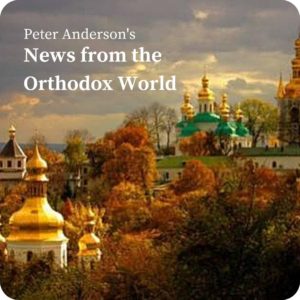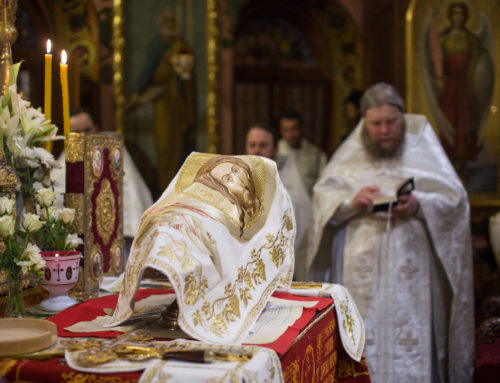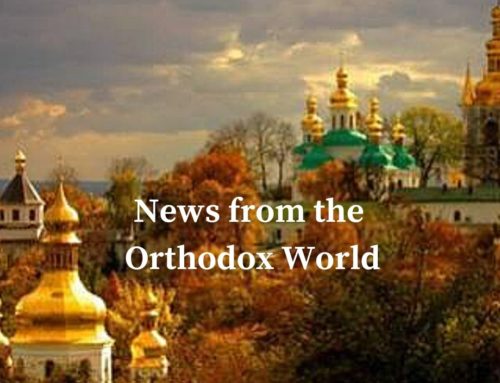
Peter Anderson reports from the Orthodox world.
Longstanding reporter of the news from the Eastern Church, Peter Anderson shares our dream of a unified Christianity. His love for Orthodoxy has driven him to this personal mission to share the news of East with the world through his email list. The Urbi et Orbi Foundation is proud to share his efforts and his insights with you.
On Saturday, September 4, Serbian Patriarch Porfirije arrived on his first visit to Montenegro as patriarch. His arrival in the capital of Podgorica appeared to be a positive and non-controversial event. The Patriarch was greeted by thousands of faithful in the square in front of the large Cathedral of Christ’s Resurrection. The Prime Minister of Montenegro, Zdravko Krivokapić, and ministers of the current government were there. So were bishops from the Local Orthodox Churches of Jerusalem, Moscow (including the UOC-MP and ROCOC), Bulgaria, Albania, Poland, and Czech Lands and Slovakia. (link) Patriarch Porfirije gave a long address urging reconciliation. (link) (full text) It included the following:
Therefore, I, together with the elected Metropolitan Joanikije and all our archbishops, ask everyone in these holy lands not to allow hatred between brothers and troubles to continue. Let’s not leave our children mortgages, neither theirs or our grandfathers. We ask for forgiveness and forgive: if I have offended you, forgive, and I forgive you in advance for everything. That is the word, that is the emotion, that is the faith of us Orthodox hierarchs, that is the faith of you Orthodox Christians, that is the faith of your new metropolitan as well.
Patriarch Porfirije had arrived on a two-day visit to Montenegro to enthrone on Sunday, September 5, Metropolitan Joanikije (Mićović) as Metropolitan of Montenegro and the Littoral. Joanikije had been chosen by the Assembly of the Serbian Orthodox Church, meeting in Belgrade in late May, to replace Metropolitan Amfilohije, who had been Metropolitan of Montenegro since 1990 and who had died from complications of the coronavirus in October 2020. Joanikije had been born in Montenegro (then part of Yugoslavia) and had spent most of his life there. Since 2002 he had been the bishop of Budva-Nikšić, a diocese in Montenegro. There was a media report that Bishop David of Kruševac, who was supposedly supported by Bishop Irinej of Bačka and who had no roots in Montenegro, was also seeking at the Assembly to be the new Metropolitan of Montenegro. It was also reported in the media that Joanikije was elected by acclamation, and not by a vote, at the suggestion of Patriarch Porfirije. The choice of Joanikije, a local son, appears to have been well-received in Montenegro. The fact that Patriarch Porfirije was now coming to Montenegro to enthrone Joanikije also seemed to be non-controversial.
However, the plan to enthrone Joanikije in the historic Cetinje Monastery turned out to be extremely controversial. Cetinje is the former royal capital of Montenegro and is located approximately 30 kilometers west of the present capital of Podgorica. Cetinje is a city of approximately 15,000, of whom approximately 91 percent are ethnic Montenegrins and approximately 4 percent Serbian. The city presently is the site of several national institutions (Ministry of Culture, national museum and library, archives) as well as the official residence of the president of Montenegro. For at least some Montenegrins, the Cetinje Monastery is considered a most sacred location for the nation of Montenegro. For example, St. Peter of Cetinje (1748-1830), a prince-bishop, who is often considered the founder of modern Montenegro, is buried there. For these Montenegrins, the enthronement in Cetinje is an attempt to put a Serbian stamp on the sacred site of Montenegrin national independence.
On August 22, there was a protest in Cetinje by approximately 12,500 against the enthronement occurring there. (link) On August 27, the mayor of Cetinje stated that enthronement at the Monastery “insults the national and religious feelings of Orthodox believers who declare themselves as Montenegrins who, as the majority people in Montenegro, have special sentiment and respect for this sacred site…” (link) He also stated that “the local administration and I as the mayor are of the opinion that this religious rite should be performed outside Cetinje.” The next day, Montenegro President Milo Đukanović, whose political party no longer controls the Montenegro government, urged that the enthronement occur away from Cetinje in order to preserve peace and stability. (link) On August 30, the Social Democrats, the party of Đukanović, called upon the government to move the enthronement to another location because holding the enthronement in Cetinje would increase tensions where there is no need. The party stated: “If that is not the case, the Social Democrats will be in Cetinje, with their citizens…” (link) It appears that all of the opposition political parties took the same position. The enthronement had obviously become a political issue where the opposition parties sought to obtain greater voter support in future elections.
However, from the perspective of the Church, Cetinje was the only proper place to hold the enthronement. Although this was the first enthronement since the establishment of the independence of Montenegro in 2006, the enthronements of the Metropolitan of Montenegro had previously always been performed there. The title of the Metropolitan includes “Archbishop of Cetinje.” (However, his cathedral is apparently now the Cathedral of Christ’s Resurrection in Podgorica.) Joanikije had previously served as head of the Monastery and as rector of the seminary in Cetinje. The Church was adamant that the enthronement occur there. On September 3, Metropolitan Joanikije gave a long and interesting interview explaining his position. (link) With respect to the objections of the city of Cetinje, he stated “they have not yet created their own state called Cetinje.” In order to lower tensions, he pointed out that the Church had agreed that only clergy would attend the enthronement. He stated: “I want this communion to continue, to accept all the brothers, both those who think differently and those who want to unite with us. When it comes to arguments, thoughts and dialogue, we are always ready to participate in that dialogue. I am not ready to exchange hatred, because in that way hatred multiplies even more, and I am in favor of conversation, dialogue and agreement with, indeed, everyone, but everyone in Montenegro. And I don’t know what else to say, that is the essence of our faith and our holy service, and that is how we will work.”
On the evening of Saturday, September 4, protesters erected blockades on the roads to Cetinje. (link) (see photos and videos). Patriarch Porfirije and Metropolitan Joanikije were brought to the Cetinje Monastery by helicopter. The following is an absolutely amazing (and sad) video showing them arriving at the Monastery, being guarded by armed riot police with full gear, and being rushed into the Monastery covered by bullet-proof blankets. (link) (3 minutes) The Liturgy was celebrated with Bishop David, the priests, and monks who had come to the Monastery the prior day before the blockade, and the enthronement was held. (link) The Patriarch, the Metropolitan, and Bishop David then departed by helicopter. Police surrounded the Monastery during the enthronement. In the town, there were many clashes between police and protesters. Apparently, the bus carrying the bishops, including those from other Local Orthodox Churches, was turned away at the barricades and returned to the Cathedral of Christ’s Resurrection for a Liturgy. (link) The following are some articles on today’s events from the international press. (link); (link); (link) ; (link) Patriarch Porfirije has now returned to Belgrade.
I am sure that there will now be accusations of excessive use of force by the police, of criminal conduct by protesters, of incitement by the Social Democrats, of reckless behavior by the existing government. There will be increased tensions between ethnic Serbs and Montenegrins in Montenegro. The repercussions from today’s events will continue for a long time. I feel especially sorry for Patriarch Porfirije, who has made forgiveness and the building of bridges the cornerstone of his service as patriarch. Today’s events present a great challenge.
From September 1-3, the world-wide hierarchy of the Ecumenical Patriarchate gathered in Istanbul to celebrate the Feast of the Indiction and the Ecclesiastical New Year and to hold an Assembly (Synaxis). On September 1, Ecumenical Patriarch Bartholomew issued his annual letter to the faithful on the protection of the natural environment. (link) (English text). At the close of the Assembly, a press announcement was released. (link) (Greek) The Assembly noted with regret “a willingness to alter Orthodox ecclesiology, as evidenced by the latest ecclesiastical and non-ecclesiastical events (abstention of four local Orthodox Churches from the Holy and Great Synod, Ukrainian ecclesiastical issue, pandemic), where some local churches deviate from the canonical tradition, a deviation in which the Great Church of Christ cannot be indifferent at all.” (link)
Patriarch Kirill on the Orthodox feast of the Dormition had some harsh words to say concerning the Ecumenical Patriarch’s recent visit to Kyiv. He stated: “And we know what is happening today in world Orthodoxy, how these forces [of evil], using the difficult situation that has developed in Ukraine, are trying to break the unity of the Orthodox Church. And in some ways they are succeeding: An example of this is the sinful and inexplicable visit of the Patriarch of Constantinople to Kiev and his concelebration with schismatics.” (link) Archpriest Nikolai Balashov, deputy head of the Moscow Patriarchate’s DECR, has given a critical review of the Ecumenical Patriarch’s addresses in Kyiv. (link) For a different view from Moscow, an analysis in the publication Novaya Gazeta has stated: “Now that the Patriarch of Constantinople has safely returned to his native Istanbul, we can say that the fears and threats that accompanied his visit and were whipped up by the Moscow Patriarchate turned out to be illusory.” (link) As a postscript to my previous report on Bartholomew’s last day in Kyiv, Vatican Secretary of State Pietro Parolin and Metropolitan Onufry, head of the UOC-MP, did meet and converse on that final day. (link)
Metropolitan Hilarion on September 3 received from Russian Foreign Minister Sergey Lavrov an award, the Ministry’s “For Cooperation Medal,” as “an important sign that shows that we appreciate cooperation with our good friends and comrades.” (link) On August 30 in Volgograd, Lavrov stated: “We have been cooperating closely with the Russian Orthodox Church (ROC) abroad. The Russian Church has parishes in many countries. It has been suffering from very strong pressure from a number of Western nations, primarily the US, which are set to ruin the unity of world Orthodox Christian churches. Patriarch of Constantinople Bartholomew played a vicious role in the attempt to break off the canonical Ukrainian Orthodox Church of the Moscow Patriarchate, which he has so far not succeeded in doing.” (link)
The 52nd Eucharistic Congress is being held in Budapest, September 5-12. Pope Francis will preside at the closing Mass on Sunday, September 12 in Budapest’s Heroes Square. From there, he will visit Slovakia, September 12-15. (link) (complete schedule in English) Ecumenical Patriarch Bartholomew on the evening of September 11 will be present as a guest at the Mass at which Hungarian Cardinal Péter Erdő will preside. (link) This Mass will be held in Kossuth Square next to the spectacular Hungarian Parliament Building and will be followed by a candlelight Eucharist procession. The next day at 11:30 a.m. the Ecumenical Patriarchate will attend as a guest the Pope’s Mass. (link) (interview of Cardinal Erdő) Earlier in the morning, he will preside at the Divine Liturgy of the Orthodox Church of the Dormition in Budapest. (link)
Pope Francis had given a long interview to a journalist from the Spanish radio station COPE. (link) (full text in Spanish) With respect to future visits, the Pope stated: “Now Slovakia is on the program, then Cyprus, Greece and Malta.” There is a recent media report that the visit to Cyprus will occur December 2-3. (link) It was reported by the media in July that the visit to Greece will occur in November. (link) Pope Francis is planning to make a short visit to Glasgow in November in connection with the 2021 United Nations Climate Change Conference. (link) On October 4, Pope Francis will host at the Vatican a meeting of world church leaders in anticipation of the Glasgow conference. Ecumenical Patriarch Bartholomew is expected to attend this meeting of church leaders at the Vatican. (link)
Peter Anderson, Seattle USA


